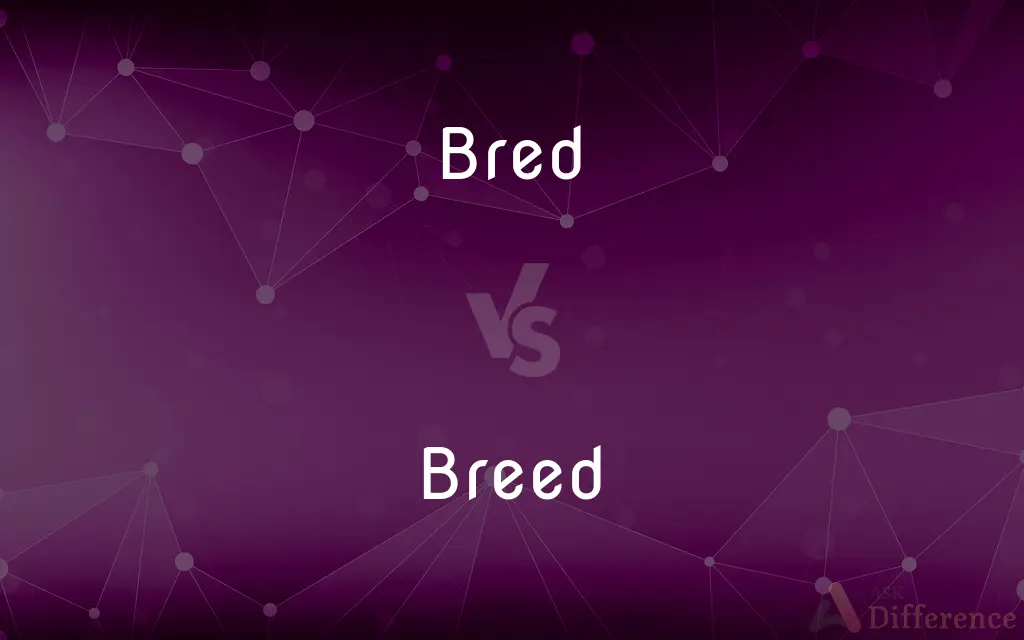Bred vs. Breed — What's the Difference?
By Fiza Rafique & Maham Liaqat — Updated on April 6, 2024
Bred is the past tense of breed, indicating the action of producing offspring, while breed refers to either the process of reproduction or a specific category of animals.

Difference Between Bred and Breed
Table of Contents
ADVERTISEMENT
Key Differences
Bred, as the past tense of the verb breed, indicates that the action of reproduction or production of offspring has already occurred. Whereas, breed can either refer to the ongoing process of reproduction or to a specific variety or group within a species, such as dog breeds.
When discussing animals, "bred" is used to describe the result of breeding efforts that have taken place, such as "The horses were bred for their speed." On the other hand, "breed" can be used to describe the action, as in "They breed cattle," or to categorize animals, as in "The Labrador Retriever is a popular dog breed."
In agricultural or zoological contexts, "bred" highlights specific characteristics or qualities that have been emphasized through selective breeding, e.g., "These plants were bred for drought resistance." Conversely, "breed" can describe the ongoing efforts to produce certain traits in animals or plants or refer to the distinct types resulting from these efforts.
The use of "bred" often implies a deliberate process undertaken by humans to achieve certain traits or outcomes in the next generation of animals or plants. In contrast, "breed" encompasses a broader range of meanings, including natural reproductive processes, the act of human-facilitated reproduction, and the categories created as a result of these processes.
"Bred" and "breed" also differ in their grammatical roles; "bred" is a verb in the past tense, indicating a completed action, while "breed" can be a noun referring to a specific category of animals or a verb referring to the act of reproduction in the present tense.
ADVERTISEMENT
Comparison Chart
Grammatical Role
Past tense verb
Present tense verb/Noun
Definition
Indicates past reproduction efforts
Refers to the process or category
Context
Describes outcomes of breeding
Describes ongoing process or types
Examples
"The dogs were bred for intelligence"
"They breed horses" / "Siamese is a cat breed"
Usage
Specific to actions completed in the past
Broader usage, including as a category
Compare with Definitions
Bred
Human Intervention.
The roses in this garden were specifically bred for their fragrance.
Breed
Reproduction Process.
Farmers breed sheep for both wool and meat.
Bred
Outcome-Oriented.
The cattle were bred to produce leaner meat.
Breed
Cultural or Functional Groups.
Working breeds of dogs have been developed for specific tasks.
Bred
Past Reproduction.
The rabbits were bred for their unique fur color.
Breed
Animal Category.
The Border Collie is a breed known for its intelligence and agility.
Bred
Selective Breeding Result.
This variety of corn was bred for increased yield.
Breed
Specific Varieties.
There are many tomato breeds, each with unique characteristics.
Bred
Achieved Traits.
These fish were bred to thrive in colder water temperatures.
Breed
Present Tense Action.
They breed exotic plants in this greenhouse.
Bred
(of a person or animal) reared in a specified environment or way
The bareness of the scene intimidated the city-bred Elizabeth
Breed
A breed is a specific group of domestic animals having homogeneous appearance (phenotype), homogeneous behavior, and/or other characteristics that distinguish it from other organisms of the same species. In literature, there exist several slightly deviating definitions.
Bred
Past tense and past participle of breed.
Breed
To produce (offspring); give birth to or hatch.
Bred
Simple past tense and past participle of breed
Breed
To bring about; engender
"Admission of guilt tends to breed public sympathy" (Jonathan Alter).
Breed
To cause to reproduce, especially by controlled mating and selection
Breed cattle.
Breed
To develop new or improved strains in (organisms), chiefly through controlled mating and selection of offspring for desirable traits.
Breed
To inseminate or impregnate; mate with.
Breed
To rear or train; bring up
A writer who was bred in a seafaring culture.
Breed
To be the place of origin of
Austria breeds great skiers.
Breed
To produce (fissionable material) in a breeder reactor.
Breed
To produce offspring.
Breed
To copulate; mate.
Breed
To originate and develop
Mischief breeds in bored minds.
Breed
A group of organisms having common ancestors and certain distinguishable characteristics, especially a group within a species developed by artificial selection and maintained by controlled propagation.
Breed
A kind; a sort
A new breed of politician.
A new breed of computer.
Breed
(Offensive) A person of mixed racial descent; a half-breed.
Breed
(transitive) To give birth to; to be the native place of.
A pond breeds fish; a northern country breeds stout men
Breed
Of animals, to mate.
Breed
To keep animals and have them reproduce in a way that improves the next generation’s qualities.
Breed
To arrange the mating of specific animals.
She wanted to breed her cow to the neighbor's registered bull.
Breed
To propagate or grow plants trying to give them certain qualities.
He tries to breed blue roses.
Breed
To take care of in infancy and through childhood; to bring up.
Breed
To yield or result in.
Disaster breeds famine;
Familiarity breeds contempt
Breed
To be formed in the parent or dam; to be generated, or to grow, like young before birth.
Breed
(sometimes as breed up) To educate; to instruct; to bring up
Breed
To produce or obtain by any natural process.
Breed
(intransitive) To have birth; to be produced, developed or multiplied.
Breed
(transitive) to ejaculate inside someone's anus
Breed
All animals or plants of the same species or subspecies.
A breed of tulip
A breed of animal
Breed
A race or lineage; offspring or issue.
Breed
(informal) A group of people with shared characteristics.
People who were taught classical Greek and Latin at school are a dying breed.
Breed
To produce as offspring; to bring forth; to bear; to procreate; to generate; to beget; to hatch.
Yet every mother breeds not sons alike.
If the sun breed maggots in a dead dog.
Breed
To take care of in infancy, and through the age of youth; to bring up; to nurse and foster.
To bring thee forth with pain, with care to breed.
Born and bred on the verge of the wilderness.
Breed
To educate; to instruct; to form by education; to train; - sometimes followed by up.
But no care was taken to breed him a Protestant.
His farm may not remove his children too far from him, or the trade he breeds them up in.
Breed
To engender; to cause; to occasion; to originate; to produce; as, to breed a storm; to breed disease.
Lest the placeAnd my quaint habits breed astonishment.
Breed
To give birth to; to be the native place of; as, a pond breeds fish; a northern country breeds stout men.
Breed
To raise, as any kind of stock.
Breed
To produce or obtain by any natural process.
Children would breed their teeth with less danger.
Breed
To bear and nourish young; to reproduce or multiply itself; to be pregnant.
That they breed abundantly in the earth.
The mother had never bred before.
Ant. Is your gold and silver ewes and rams?Shy. I can not tell. I make it breed as fast.
Breed
To be formed in the parent or dam; to be generated, or to grow, as young before birth.
Breed
To have birth; to be produced or multiplied.
Heavens rain graceOn that which breeds between them.
Breed
To raise a breed; to get progeny.
The kind of animal which you wish to breed from.
Breed
A race or variety of men or other animals (or of plants), perpetuating its special or distinctive characteristics by inheritance.
Twice fifteen thousand hearts of England's breed.
Greyhounds of the best breed.
Breed
Class; sort; kind; - of men, things, or qualities.
Are these the breed of wits so wondered at?
This courtesy is not of the right breed.
Breed
A number produced at once; a brood.
Breed
A special lineage;
A breed of Americans
Breed
A special variety of domesticated animals within a species;
He experimented on a particular breed of white rats
He created a new strain of sheep
Breed
Half-caste offspring of parents of different races (especially of white and Indian parents)
Breed
A lineage or race of people
Breed
Call forth
Breed
Copulate with a female, used especially of horses;
The horse covers the mare
Breed
Of plants or animals;
She breeds dogs
Breed
Have young (animals);
Pandas rarely breed in captivity
Common Curiosities
What does "bred" signify in animal husbandry?
"Bred" signifies that an animal has been specifically mated and produced offspring, often with desired traits.
How does selective breeding affect biodiversity?
Selective breeding can reduce biodiversity by focusing on certain traits, potentially leading to a loss of genetic diversity.
Can inbreeding be a concern in animal breeds?
Yes, inbreeding can be a significant concern, leading to health problems and reduced genetic diversity.
What is the importance of knowing animal breeds?
Knowing animal breeds helps in understanding their behavior, care needs, and suitability for various tasks or environments.
Is "bred" only used in a professional context?
No, "bred" can be used in both professional and casual contexts to describe the result of breeding animals or plants.
How does one choose which animals to breed?
Animals are chosen based on desired traits, health, genetics, and suitability to contribute to the improvement of the breed.
Can "breed" be used to refer to plants?
Yes, "breed" can refer to the process of developing new plant varieties with specific characteristics.
How do breeders ensure the health of bred animals?
Breeders ensure health by selecting healthy parents, genetic testing, and adhering to breeding standards.
What are heritage breeds?
Heritage breeds are traditional livestock breeds that were bred over generations for their adaptability to local environmental conditions.
Why are some plant varieties specifically bred?
Plant varieties are bred for disease resistance, climate adaptability, yield, and other desirable traits.
What is a breed standard?
A breed standard is a set of guidelines that describe the ideal characteristics, temperament, and appearance of a breed.
What role do genetics play in how animals are bred?
Genetics is crucial in breeding, as it determines the traits that can be passed down and selected for in offspring.
What's the difference between cross-breeding and purebred?
Cross-breeding involves mating animals of different breeds, while purebred refers to animals bred from parents of the same breed.
How has dog breeding changed over the years?
Dog breeding has evolved with changing human needs and aesthetics, sometimes leading to health issues in breeds.
Can any animal be bred for specific traits?
While many animals can be selectively bred for specific traits, the success and ethics of doing so vary widely.
Share Your Discovery

Previous Comparison
Kineme vs. Kinesics
Next Comparison
Texture vs. GrainAuthor Spotlight
Written by
Fiza RafiqueFiza Rafique is a skilled content writer at AskDifference.com, where she meticulously refines and enhances written pieces. Drawing from her vast editorial expertise, Fiza ensures clarity, accuracy, and precision in every article. Passionate about language, she continually seeks to elevate the quality of content for readers worldwide.
Co-written by
Maham Liaqat















































